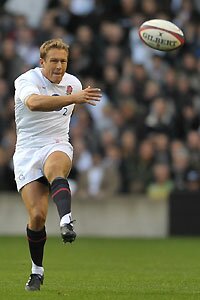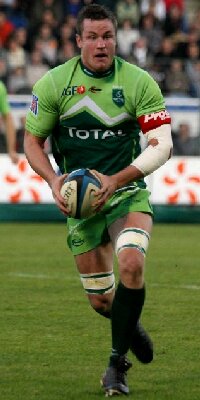|
|
Special Feature: The role of rugby in sporting culture within the SW of France, part II
By Markus Findlay, 10 December 2009
|

It started with a kick... - Jonny
Wilkinson made a huge impact
Photo: Michael Paler
|
[In the summer of 2009 a young UK-based student called Markus Findlay came to France to investigate (as the above headline suggests) the cultural role of rugby within the French playing heartland of the south west. His trip was part-funded by a scholarship called the Charles de Gaulle Bursary which was awarded by The British Council. What follows is the part II of the end product he was required to submit, and it's even got a section in French for those keen to test their linguistic skills]
On that ever so special November day in 2003, when a certain Jonny Wilkinson kicked the drop-goal that would bring the Rugby World Cup to the Northern Hemisphere for the first time in history, my own passion for the sport was sparked - just as with many of my generation. It captured the heart of the nation and made a huge impact on the sporting community. The golden Web Ellis Cup even made a celebratory visit to my home, the rural market town of Nantwich in Cheshire, the newspaper cutting of which still mounts my bedroom wall, now faded and bleached by sunlight. It is fair to say that I would probably not be writing this article had that kick not bisected the posts in the dying minutes of the game.
But exactly four years on in 2007, it was France who held the tournament. A key element to my project was exploring whether the hosting of the Rugby World Cup had a similar cultural impact in France, as the victory of the tournament did for England? When I entered the office concerned with the école de rugby in Albi, I was shown figures of the subscription to the club, from both before and after the tournament. To my surprise I discovered a double in the recruitment levels of the youth teams, two hundred members before the World Cup, four hundred after.
There was a similar trend at amateur club Tulle. The junior subscription to their club showed an increase of 30% following the World Cup. Clearly the fact that France played host influenced the younger generation to participate in the sport. It is interesting however, that this reaction occurred despite the hosting nation’s failure to win the tournament (France knocked out in the semi-final by none other than England). Usually, such a sporting frenzy, for example the Rugby World Cup 2003, or The Ashes of 2005 occurs only after a victory, when the country receives a boost of patriotism, and prides itself on being the best at something.
Cultural impact
Success, it seems, is the formula for nationwide zeal. Strangely, France is a perfect example of how a country can suddenly change its mood, which is why it is peculiar that the 2007 World Cup had such an impact on the culture. In the article that perhaps triggered the theme of my project, this typically French quality was illustrated to me. Gavin Mortimer’s ‘Bonjour and Bienvenue’ from the magazine Rugby World, stated that “in the weeks leading up to the 1998 Football World Cup, the majority of the French public didn’t appear very interested in what was going on because they had no chance of winning. It was only when Les Bleus topped their pool and then beat Italy to reach the semi-finals that the French really sat up and took notice.” Of course France then won the competition, but as Mortimer puts it, it’s funny “how success can turn the apathetic into the enthusiastic, and transform the fag-smoking into the flag-waving.”
In England, similar to the majority of the French sporting public, rugby is an irrelevance - football is all that matters. As Mortimer’s article points out, in England the divide between the two sports has “traditionally been along class lines”. To illustrate this, in the last England international fixture there were only three players in the entire starting line up who were educated at state schools. Whereas, unusually in France “it’s a geographical border that separates the two”.
The south-west of France is often nicknamed ‘Pays de l’Ovalie’ - ‘the land of the oval ball’ - due to the concentrated rugby enthusiasm in the area. If you draw a line across the middle of France from La Rochelle in the west to Lyon in the east, of the thirty clubs in the professional divisions (Top 14 and Pro D2), only the two Paris clubs Stade Français and Racing Métro, are north of the line. Despite the strongholds of Marseille and Lyon, rugby dominates in the bottom half of the country, and “the majority of the France squad where born in the south”.
This particular cultural comparison fascinated me, and provided huge inspiration for my project. But the answer as to why this divide exists caused me to do wider research. Once again it was John Daniell’s book that provided the most pertinent answer. I have already mentioned how rugby in the south is largely an expression of character. This is linked to the very French idea of terroir, the notion that a “product draws its identity from the soil in which it is produced and its character from the culture that surrounds it”. This romantic sense of rootedness manifests itself more strongly in the south, where the sport “thrives in the hothouse environment of small French towns”.
‘La Grande Invasion’
Au début de mon séjour à Toulouse j’ai fait une promenade au centre ville pour découvrir de première main la célèbre ville rose. Près de la place du Capitole, dans un kiosque j’ai remarqué, sur la couverture du journal de rugby ‘Midi Olympique’ (surnom ‘MidOl’) le titre: ‘La Grande Invasion.’ Un article au sujet de l’émigration des joueurs britanniques dans la ligue française le Top 14 - peut-être le plus grand débat dans le sport que jamais.
Depuis je pensais à faire ce projet (l’hiver dernier), le thème de rugby en France est devenu un grand événement de l’actualité dans le monde de sport, tout à cause de cet exode. En fait, le journalist sportif Colin, que j’ai déjà mentionné, recevait plus de visites à son site Web après l’exode. Cependant, je dois dire que ce débat a rendu mon projet de plus en plus intéressant. En plus, je trouvais la question très utile en ayant créé les conversations animées pendant ma période d’étude.
D’un côté, il y a les gens qui pensent que l’arivée des étrangers est seulement une mauvais chose pour la culture mondiale du rugby. La légende française Serge Blanco a dit, « on devrait établir une limite du nombre des joueurs étrangers dans nos ligues pour permettre nos joueurs français à obtenir leur potentiel. »
De l’autre côté, il y a les gens qui croient que en achetant ces joueurs, le Top 14 deviendra plus attrayant, et que c’est aussi une autre façon pour les petites équipes de combattre les grandes équipes avec les meilleurs joueurs, comme par exemple, Stade Toulousian et Stade Français. Je découvrais pendant mon stage au Club Athletiqué Briviste (l’équipe avec la plupart des joueurs britanniques), que ce plan était utilisé parce que c’était la seulement façon pour rivaliser avec les équipes qui attirent les meilleurs joueurs français.
|

Helping hand: Pau's Australian
captain Paul Dearlove
|
De mon point de vue, j’étais agacé quand six joueurs sont parti ma équipe préférée Sale Sharks pour jouer en France. Je voyais les raisons pourqoui on quitterait l’Angleterre pour commencer une nouvelle carrière en France. Pendant cette récession mondiale, où l’euro est plus fort que la livre, une occasion d’émigrer est bien sûr raisonnable économiquement. Mais au départ je pensais l’expression française: « l’argent est la mère de tous les vices » était appropriée pour décrire cette situation éprouvante. Il semblait que l’exode et la culture française de rugby en générale, était une question d’économie.
Comme nous avons conduit à travers la campagne pyrénéenne dans son Land Rover en direction Pau, Colin Spiro (en portant son chapeau de cow-boy en paille) a expliqué à moi un peu au sujet d’économie de rugby en France. J’ai appris que quelque chose particulier à sport en France, est que les équipes professionnelles peuvent recevoir financement du maire local. Nous sommes arrivés au stade du Section Palois, l’équipe de la ville de Pau, pour notre interview du jour. Comme expliqué par l’Australien Paul Dearlove, leur capitaine amicable, « Section Palois rivalise avec l’équipe de basket locale pour gagner l’argent du maire. » J’ai déjà établi que, dans le sport professionel l’argent est primordial, et de nos jours les équipes ont un plus grand besoin pour la finance. John Daniell a décrit l’expression: « le sport professionel » d’être « un oxymoron » parce que en principe, les deux équipes dans une rencontre sportive devraient toujours une chance pour gagner le match. Malheureusement souvent l’équipe avec le plus d’argent a l’avantage.
Cependant, malgré la nécessité pour l’argent, la culture française du rugby a une philosophie égalitaire, les billets pour les matchs sont presque toujours bon marché et permet tout le monde d’apprécier le sport. Je crois vraiment que les structures sportives en Grande Bretagne peut apprendre quelque chose de cette philosphie inclusive.
Acknowledgements
I would like to thank The British Council for giving me the unique opportunity to embark upon an adventure where I not only explored a subject I am deeply passionate about, but improved my French dramatically and learnt how to fend for myself in an unknown environment.
- Special thanks to Colin Spiro, who made my time abroad possible and as interesting and remarkable as it was.
- Special thanks also to Keith Charge and the team at Brive including Simon Gillham, Joël Gabarrou, Steve Thompson, and Riki Flutey whose generosity allowed me to experience the best ten days of my trip.
- Special thanks to Paul Dearlove and his family for their kindness and hospitality.
- Special thanks to the Sale Sharks, Albi Rugby Club, Pau Rugby Club, Tulle Rugby Club, and Toulouse Rugby Club.
Markus Findlay Charles de Gaulle Bursary 2009
Part I - The start of the journey
|
|